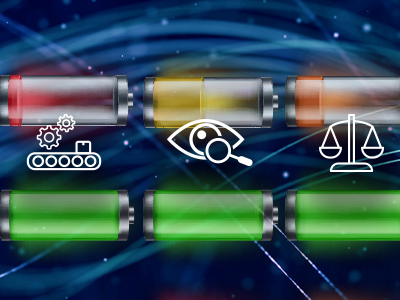Overview
Learn how to effectively manage battery safety and lifecycle in battery pack design. Learn about applications of Battery Management Systems (BMS) in electric vehicles, energy storage and consumer electronics.
Explore the vital role of Battery Management Systems (BMS) in ensuring the performance, safety, and longevity of lithium-ion battery packs. This course is designed for engineers, researchers, and technical professionals seeking in-depth knowledge of battery technology and pack management systems.
- Comprehensive Coverage: Delve into the key functions of BMS for battery packs, including protection, and monitoring of the state of the battery.
- Practical Insights: Understand critical pack-level parameters such as voltage, current and temperature, and explore advanced topics in thermal management and fault detection for battery packs.
- Real-World Applications: Discover how BMS is implemented in the real world, directly impacting the reliability and efficiency of battery packs.
- Expert Instruction: Taught by experienced professionals in battery research and engineering, with theoretical insights and practical applications.
Focusing on both foundational concepts and future innovations, this course equips you with the skills to effectively designbattery management system (BMS) for cutting-edge energy solutions.
What You'll Learn
- Understand the role and importance of BMS
- Identify BMS functions and design challenges
- Classify and understand cell balancing topologies
- Apply models and algorithms for SOC and SOH estimation
- Recognize non-ideal factors in battery management systems
- Know the design concerns in thermal management system for battery packs
Details
Course Syllabus
Week 1: Introduction to Battery Management Systems (BMS)
Explore the foundational concepts of BMS, understanding their importance, core functions.
Topics Covered:
- Overview of BMS functions and their relevance to battery safety.
- BMS architecture and typical industrial solutions.
Week 2: State of Charge (SOC) estimation
Delve into state of charge, focusing on the estimation approaches based on the measurable parameters.
Topics Covered:
- Measurable and unmeasurable impactful parameters.
- Various SOC estimation methods
Week 3: Cell balancing techniques
Learn about various cell balancing strategies, essential for maintaining high availability of battery capacity and extending lifespan of battery pack.
Topics Covered:
- Classification of cell balancing methods.
- Comparison of passive vs. active balancing topologies.
- SOC and SOH based balancing concepts
Week 4: Degradation, estimation & fault detection
Focus on the techniques for estimating SOH and detecting faults, which are critical for safety, maintenance, residual value estimation, and optimal utilization.
Topics Covered:
- Cycle counting based aging estimation
- Data-driven approaches for impedance-based SOH estimation
- Threshold-based fault detection
- Data-driven approaches for fault detection
Week 5: Thermal management system design
Understand the influence of temperature on battery performance and explore thermal management strategies.
Topics Covered:
- Effects of temperature on battery operation and health.
- Design considerations for thermal management systems.
- Long-term implications of temperature regulation on battery life.
Week 6: Future of BMS and emerging technologies
Conclude with an exploration of the latest advancements in battery management and the ongoing challenges within the field.
Topics Covered:
- Could BMS.
- Battery digital twin.
Qualifications
Chartered Engineering Competences
All our online courses and programs have been matched to the competences determined by KIVI’s Competence Structure, a common frame of reference for everyone, across all disciplines, levels and roles.
These competences apply to this course:
- A1: Extend your theoretical knowledge of new and advancing technologies.
- B3: Manage implementation of design solutions, and evaluate their effectiveness.
- E3: Undertake engineering activities in a way that contributes to sustainable development and a circular economy.
Admission
This is a Massive Open Online Course (MOOC) that runs on edX.
Prerequisites
Basic knowledge of electrical engineering.


